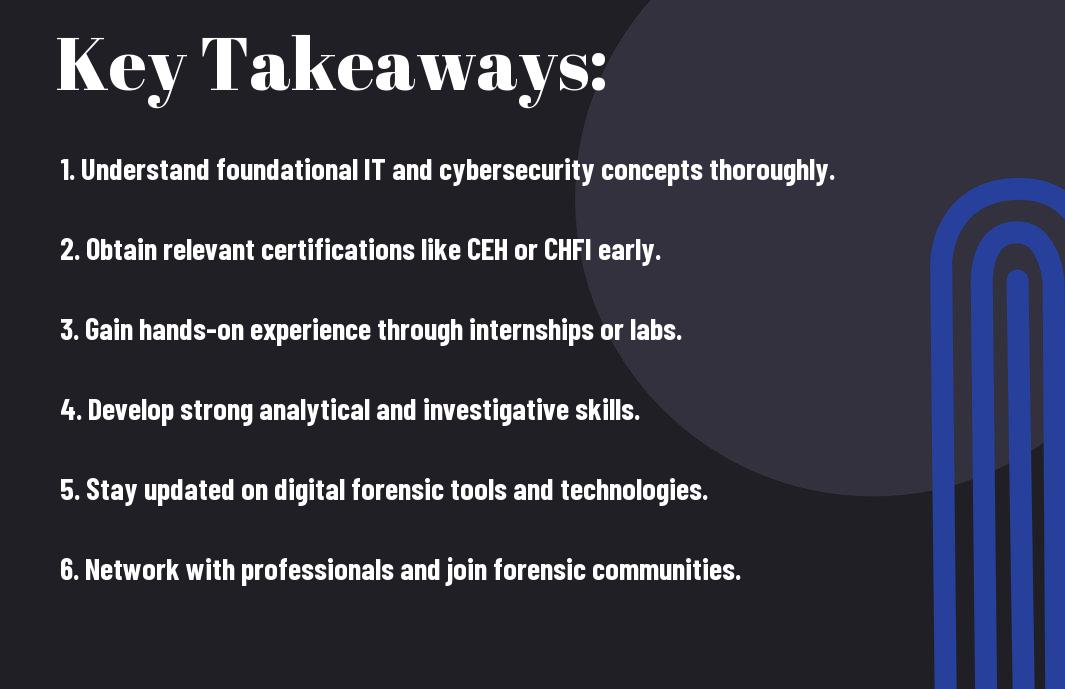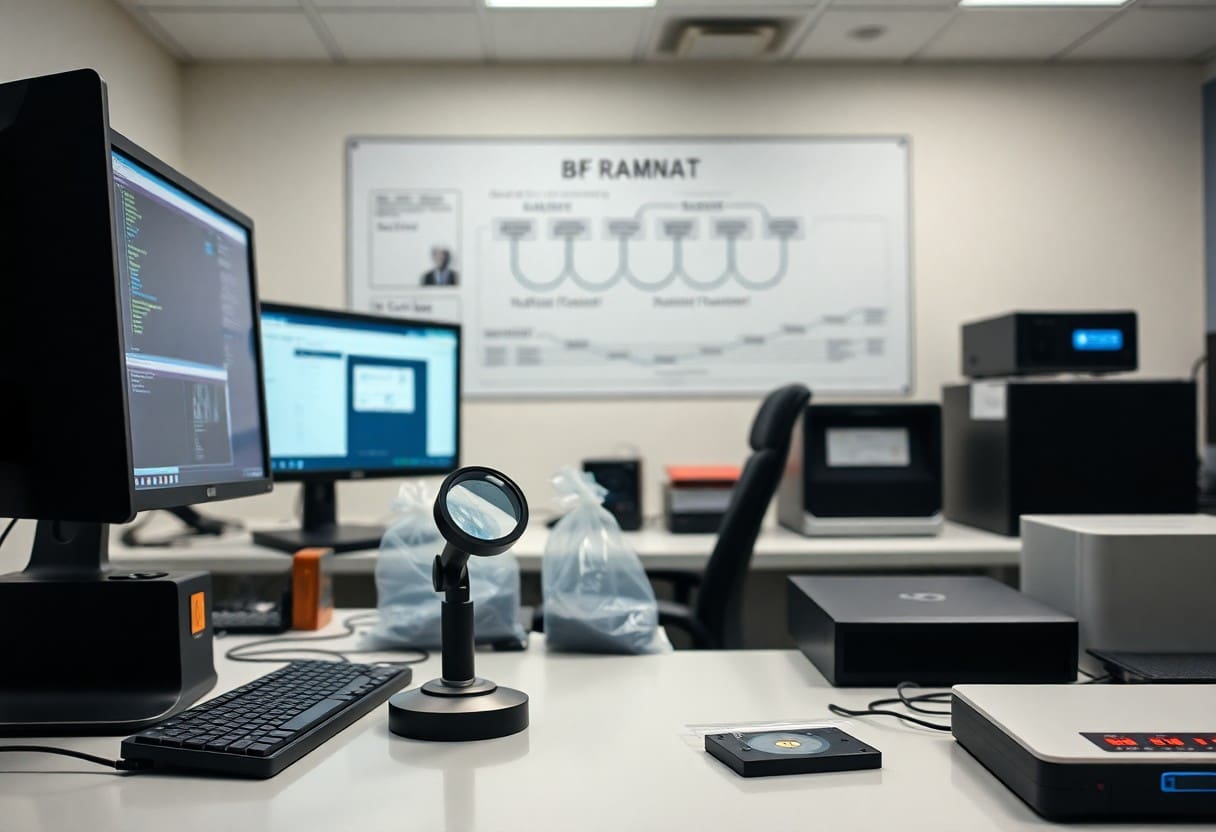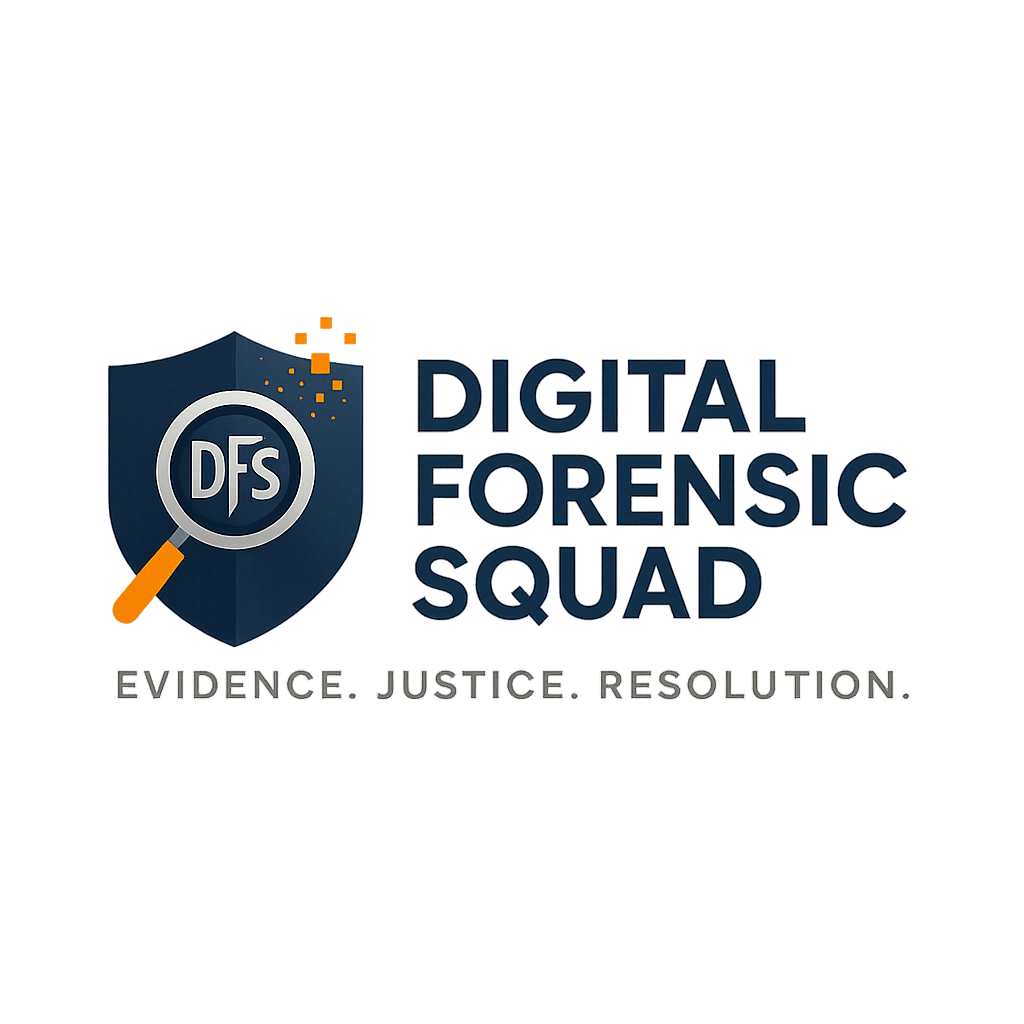There’s a growing demand for skilled professionals in digital forensics, a field that combines technology and investigative skills to uncover digital evidence. If you have a knack for problem-solving and a passion for technology, you can build a rewarding career in this area. This roadmap will guide you through the important steps, from acquiring the right education to gaining practical experience, ensuring you are equipped to face the challenges ahead while making a positive impact in investigations involving cybercrime and data breaches. Visit Digital Forensic Squad to learn more about a career in digital forensics.
Key Takeaways:
- Begin by acquiring a strong foundational knowledge in computer science, cybersecurity, and digital forensics principles through relevant courses and certifications.
- Gain practical experience by participating in internships, labs, or volunteer opportunities that allow you to work on real-world digital forensics cases and tools.
- Network with professionals in the field through conferences, online forums, and social media to stay updated on trends and career opportunities in digital forensics.
Understanding Digital Forensics
For anyone interested in pursuing a career in digital forensics, it is important to familiarize yourself with the field’s fundamentals. Digital forensics involves collecting, analyzing, and preserving electronic data to support investigations, often in the context of cybercrime and legal proceedings. This understanding lays the groundwork for more advanced topics and techniques you will encounter in your journey.
Definition and Scope
One of the primary aspects of digital forensics is its definition and scope, encompassing everything from data recovery and malware analysis to incident response and eDiscovery. As a digital forensic investigator, you’ll be tasked with identifying and preserving digital evidence, ensuring that it is admissible in court while working diligently to uncover the truth behind cyber incidents.
Key Concepts and Terminology
After you dive deeper into digital forensics, you’ll encounter a variety of key concepts and terminology important for effective communication and understanding within the field. These terms provide the foundation for your knowledge and enable you to navigate complex investigations and collaborate with other professionals.
It is vital to grasp terms such as chain of custody, which refers to the process of maintaining and documenting the handling of evidence, ensuring it is not tampered with. Understanding forensic imaging is equally important, as it involves creating an exact copy of data to analyze without altering the original evidence. Familiarize yourself with concepts like malware analysis to comprehend the techniques used to dissect harmful software. This knowledge will ensure you can engage effectively with your peers and navigate the intricacies of investigations with confidence.

Required Skills and Education
One of the most important aspects of building a career in digital forensics is acquiring the right skills and education. You will need a blend of technical knowledge and practical experience to effectively analyze and investigate digital crimes. Understanding cybersecurity principles, gaining proficiency in various operating systems, and familiarizing yourself with forensic tools are imperative to succeed in this field.
Technical Skills
An understanding of diverse technical skills is vital for your success in digital forensics. Expertise in programming languages like Python or C++, coupled with knowledge of network protocols and encryption, will enhance your investigative capabilities. Furthermore, hands-on experience with forensic software tools, such as EnCase or FTK, is indispensable as you analyze data and collect evidence.
Educational Pathways
Across the landscape of digital forensics, several educational pathways can lead you to a successful career. You may pursue a degree in computer science, information technology, or specialized programs focused on digital forensics. Certifications, such as Certified Information Systems Security Professional (CISSP) or Certified Computer Examiner (CCE), can further validate your skills and give you a competitive edge in the job market.
Educational programs often provide a balanced mix of theory and practical application, ensuring you develop both your technical and analytical skills. Hands-on training through internships or lab work is typically integrated into curricula to deepen your understanding of real-world scenarios. As you seek choices, look for institutions offering accredited programs and industry-recognized certifications; these details can greatly enhance your job prospects in the digital forensics arena.

Certifications in Digital Forensics
Many professionals find that obtaining certifications in digital forensics is vital for advancing their careers. These certifications not only validate your skills and knowledge but can also open doors to new job opportunities. As the field continues to evolve, staying current with industry standards through certification can enhance your credibility and marketability.
Popular Certifications
Certifications like the Certified Cyber Forensics Professional (CCFP), Certified Computer Forensics Technician (CCFT), and EnCase Certified Examiner (EnCE) are widely recognized in the industry. Obtaining these credentials demonstrates your expertise and commitment to the field of digital forensics, making you a more attractive candidate to potential employers.
Benefits of Certification
With certification, you gain not only a competitive edge in the job market but also the opportunity to expand your knowledge and skills. Employers often prefer certified candidates as they demonstrate a commitment to the profession and an understanding of digital forensics best practices.
Popular certifications can significantly enhance your career prospects and earning potential. They signal to employers that you possess a strong understanding of digital forensics principles and practices. Additionally, gaining certification can facilitate networking opportunities with other professionals in the field, helping you to stay informed about emerging trends and techniques. As your skills grow with these recognized credentials, you’ll likely see an increase in job opportunities and your overall confidence in handling complex digital investigations.
Gaining Practical Experience
Not all learning happens in classrooms; gaining practical experience is vital in digital forensics. Engaging in real-world scenarios, whether through internships or entry-level roles, offers you a unique opportunity to apply theoretical knowledge and build your skill set. This hands-on experience makes you more marketable and prepares you for the complexities of the field.
Internships and Entry-Level Positions
Gaining experience through internships and entry-level positions will help you develop imperative skills and insights into the industry. These opportunities can serve as a stepping stone to more advanced roles, allowing you to network with professionals, learn from seasoned experts, and create a strong foundation for your career.
Building a Portfolio
Internships are great starting points for building a portfolio that showcases your skills and projects. Begin by documenting your work, whether through case studies, analysis reports, or presentations from specific projects you have completed. Include any tools you have used and methods applied. Highlight your unique contributions and outcomes achieved. A well-structured portfolio can be a game-changer during job interviews, helping potential employers understand the value you bring to their team.
Building a portfolio with a methodical approach ensures that you present your best work. Focus on incorporating a variety of projects that demonstrate different skills, like evidence collection, analysis techniques, and software use in digital forensics. Ensure that your portfolio is organized and visually appealing; this professional touch can set you apart. Don’t forget to maintain an ongoing record of your achievements and experiences, as this will further illustrate your dedication and capability in the rapidly evolving field of digital forensics.
Job Market and Career Opportunities
Despite the rapid growth of technology and the increasing prevalence of cybercrime, the field of digital forensics offers a promising landscape for those seeking a career. As organizations worldwide realize the importance of safeguarding their information, there is a increasing demand for professionals with expertise in digital investigations. Your skills can position you favorably in a competitive job market, providing plentiful opportunities in various sectors.
Industry Demand
Opportunities abound in digital forensics as industries ranging from law enforcement to finance are actively seeking skilled professionals. The surge in data breaches and cyber threats has led to a higher requirement for experts who can analyze and interpret digital evidence, ensuring a strong demand for your expertise in this dynamic field.
Potential Career Paths
Potential career paths in digital forensics include roles such as forensic analysts, incident responders, and cybercrime investigators. With the right set of skills and experience, you can explore various positions within law enforcement agencies, private sectors, or even consultancy firms specializing in cybersecurity. These roles not only provide you with an opportunity to contribute positively to society, but they also involve solving complex challenges that can be thrilling and rewarding.
The range of career paths in digital forensics is extensive and diverse. You may decide to work as a forensic analyst, where you will focus on analyzing digital devices and recovering data from compromised systems. Alternatively, you could take on the role of a cybercrime investigator, gathering evidence for law enforcement and playing an important part in prosecuting cybercriminals. Your journey in digital forensics can also lead you to specialize in incident response, helping organizations mitigate and address security breaches in real time. With your dedication and expertise, you can shape a fulfilling career that contributes to a safer digital environment.
Continuing Education and Professional Development
After establishing a foundation in digital forensics, it’s crucial to focus on continuing education and professional development to advance your career. Engaging in ongoing training, certifications, and specialized courses will not only enhance your skills but also keep you competitive in this ever-evolving field. Staying informed about the latest technologies and methods will deepen your expertise and open up new opportunities for growth.
Staying Current with Trends
Between rapidly changing technology and emerging cyber threats, staying current with trends in digital forensics is paramount. Subscribing to industry journals, attending workshops, and participating in webinars can provide valuable insights into new tools and methodologies. Regularly engaging with thought leaders and expert discussions will ensure you remain ahead of the curve in this dynamic landscape.
Networking Opportunities
With a wide range of networking opportunities available, you can build valuable connections within the digital forensics community. Attend industry conferences, join professional organizations, or participate in online forums where you can meet experienced professionals and peers. Actively engaging in these spaces will not only expand your network but also provide opportunities for mentorship, collaboration, and learning from others’ experiences.
Opportunities for networking are abundant, and they play an crucial role in your career growth. Attend industry-specific events such as conferences and workshops, where you can meet influential professionals and establish lasting relationships. Join local and online professional organizations and forums that focus on digital forensics, where you can share knowledge and best practices. Additionally, consider seeking a mentor in the field, as they can provide guidance and help you navigate your career path effectively. By making the effort to connect with others, you will create a supportive network that can enhance your career potential and open doors to new opportunities.
To wrap up
So, as you commence on your journey to build a career in digital forensics, focus on acquiring necessary skills and certifications, while networking with industry professionals. Your understanding of legal standards and technical expertise will be vital for success. Keep learning through courses and hands-on experiences, and don’t hesitate to seek mentorship. By following this roadmap, you will position yourself as a knowledgeable and capable candidate ready to tackle the challenges of the digital investigation landscape. Join us at Digital Forensic Squad to become a part of world renowned specialists.
FAQ
Q: What educational path should I pursue to enter the field of digital forensics?
A: A solid foundation typically begins with obtaining a degree in computer science, information technology, or a related field. Many universities offer specialized programs in cybersecurity or digital forensics. Certifications can further enhance your qualifications; consider pursuing certifications such as Certified Computer Examiner (CCE), EnCase Certified Examiner (EnCE), or Certified Ethical Hacker (CEH). Practical experience through internships or entry-level positions in IT or cybersecurity can also provide valuable insights and skills that will benefit your career in digital forensics.
Q: What are some common career paths available in digital forensics, and what roles can I aspire to?
A: There are various career paths within digital forensics, catering to different interests and strengths. Some common roles include digital forensic analyst, incident responder, malware analyst, and forensic consultant. As you gain experience, you may advance to specialized positions like senior forensic investigator or manager of a digital forensics team. Some professionals also transition into roles in broader cybersecurity management or compliance. Continuous learning and staying updated on the latest technologies and methods in the field will help you progress in your career.


